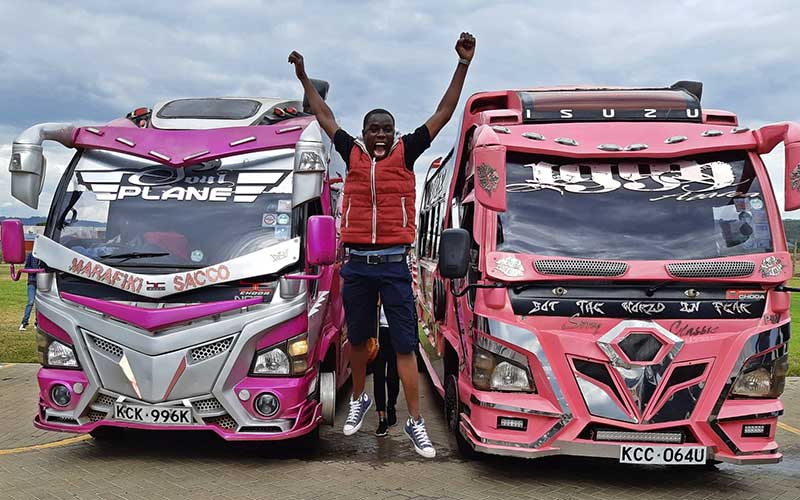
Can you recall the exact instance when you first fell in love with Matatus?
As a child, I used to walk to and fro school. During my trek, I would encounter matatus and I fell in love with all things matatus as they excited me.
Have you ever engaged in a physical altercation over a matatu?
No. But am used to ridicule. When starting out, the concept was young so whenever I explained it to anyone, it wouldn’t sense to them.
The only jobs most people knew of in the matatu industry were those of the conductor and driver.
Having studied catering, did your parents support your new career choice?
After my secondary school education my parents asked me to choose a profession. Since I had done Home Science in High School, I settled for culinary arts which I studied for two years.
I practised it for two years before quitting and joining the matatu industry.
My parents took no issue with my switch but often wondered if it could sustain me.

Since you established Matwana Matatu culture so many things have happened. You have been featured on CNN and besides you are a BLAZE BYOB mentor. Did you expect to be where you are at this moment?
No, I never expected it as I started out only doing it for fun. I didn’t take it as a business.
It took almost five years for me to start making money from it. I started introducing services and events revolving around matatus and things just picked up.
What makes you road trips stand out?
Matwana Matatu culture has rules for road trips that keep the passengers in check. We observe discipline and behaviour like hanging carelessly when the matatu is in motion is prohibited.
We also have first aid services and ensure the matatu crew are sober.
From the start, my goal has been to revolutionize the matatu industry and build value from it. I take it very seriously and would not like to the industry’s name. I build platforms with likeminded individuals who were positive about the industry and who understood our goals.
Tell us about your pricing…
Our charges are a bit higher because our services are of the highest standards. We have activities to keep out clients entertained like team building activities, nyama choma etc. Our clients get value of their money.
The last 2016 Nganya awards held at KICC were messy and unfortunately, one person died after getting run over by a matatu. How will convince someone that there is need to reward good matatus in the backdrop of all that drama that was witnessed…
There is need to recognize matatus as there are those that have stood out in the industry. Good examples are like those giving special attention to the disabled and the pregnant. There are a lot of things to be celebrated.
You established Matwana Matatu culture to preserve the culture. Don’t you think that the matatu culture might one day be extinct?
I believe it is something that can happen because compared to a while back, the industry has undergone many transformations.
The government policy to introduce high-capacity buses will subsequently lead to losses for matatu stakeholders.
Nevertheless, I feel the culture will be preserved in a way because it is not all about posting pictures and videos on the internet. It’s something deeper than that.
We have plans that we are working on, among them training people on things revolving around matatusT, ensuring that the culture is preserved.

What challenges do you face in the industry?
There are some people who do not play their roles as is expected of them, be it the SACCOs, the lobby groups etc. That makes us vulnerable because it is hard to challenge the government as an individual.
Have authorities like Matatu Owners Association recognize the role you are playing in the industry?
No. They don’t recognize us but I have no problem with that because I believe we are championing for different things. We are pursuing art and culture more, while they might be having their own goals.
We are more into youth employment and culture as opposed to just being in the in transport sector.
Parting shot to the youth…
Drink responsibly and follow your dreams no matter how small it is. Be creative and create your space because we have potential.
The youth should not complain about capital to start off because it is the idea that sells. Make use of the available resources and be patient. Start from somewhere and with people’s support you will make it.
Transcribed from Brian Wanyama’s #WordWithSDE interview with William Osoro.
Would you like to get published on Standard Media websites? You can now email us breaking news, story ideas, human interest articles or interesting videos on: [email protected]
 The Standard Group Plc is a multi-media organization with investments in media
platforms spanning newspaper print
operations, television, radio broadcasting, digital and online services. The
Standard Group is recognized as a
leading multi-media house in Kenya with a key influence in matters of national and
international interest.
The Standard Group Plc is a multi-media organization with investments in media
platforms spanning newspaper print
operations, television, radio broadcasting, digital and online services. The
Standard Group is recognized as a
leading multi-media house in Kenya with a key influence in matters of national and
international interest.
